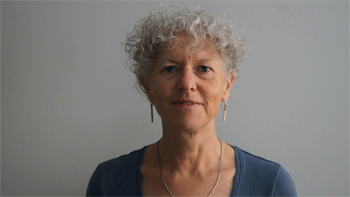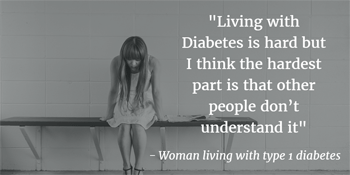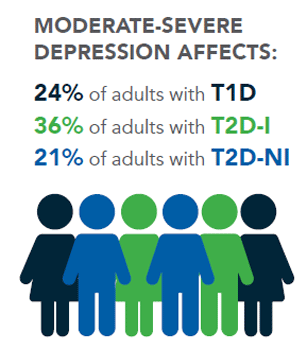Dr Christel Hendrieckx Link Between Diabetes and Depression Interview

Dr Christel Hendrieckx Link Between Diabetes and Depression Interview
This year's World Health Day (Friday 7 April) focuses on depression. Globally, around 350 million people of all ages and from all walks of life suffer from depression. People with depression are more likely to develop type 2 diabetes and depression is more common and highly recurrent in people with diabetes.
Professor Jane Speight, Foundation Director of the Australian Centre for Behavioural Research in Diabetes (ACBRD), comments that 'our Diabetes MILES-2 study found that 36% of people with insulin-treated type 2 diabetes; 21% of people with non-insulin-treated type 2 diabetes; and 24% of people with type 1 diabetes experience depressive symptoms. These rates are two to three times higher than in the general population".
Resources released last year under the National Diabetes Services Scheme highlight why diabetes health professionals need to know about depression and how to help people with diabetes who may be affected. Entitled: Diabetes and Emotional Health: A handbook for health professionals supporting adults with type 1 or type 2 diabetes, these resources were developed by the ACBRD in collaboration with Diabetes Australia.
Diabetes Victoria CEO Craig Bennett comments that, 'it is vitally important that those people living with diabetes who experience symptoms of depression seek help, and have access to suitable treatment. Diabetes health professionals need to understand how to identify depressive symptoms and be prepared to discuss mental health issues. These resources will help with that."
Dr Christel Hendrieckx, Senior Research Fellow at the ACBRD and lead author of these resources comments that, 'these new resources will help health professionals to recognise signs of depression and be more confident in having conversations about depression, including coping strategies, with people living with diabetes."
'Some common signs that people with diabetes may be experiencing depressive symptoms include declining motivation to engage in diabetes self-care tasks, as well as more frequent presentations to health professionals with the same symptoms or missed appointments," said Dr Hendrieckx, who is also a Clinical Psychologist.
Diabetes Victoria offers an array of education programs & services for people living with all types of diabetes, including online and face-to-face peer support programs. 'Our Diabetes MILES-2 study found that people who took part in peer support programs felt less alone and more motivated to manage their diabetes," according to Professor Speight.
We support, empower and campaign for all Victorians affected by diabetes.
Interview with Dr Christel Hendrieckx, Senior Research Fellow at the Australian Centre for Behavioural Research in Diabetes (ACBRD)
Question: What do you hope to achieve from this year's World Health Day focus?
Dr Christel Hendrieckx: Depression is one of the most common mental health issues experienced by Australians. People with depression are more likely to develop type 2 diabetes and depression is more common and highly recurrent in people with diabetes. This year's World Health Day campaign, led by the World Health Organisation, is a wonderful opportunity for us to highlight the link between diabetes and depression.
Dr Christel Hendrieckx: Together with Deakin University, we have helped to establish the Australian Centre for Behavioural Research in Diabetes (ACBRD). Since 2010, the ACBRD has changed the way many people think and talk about diabetes. The ACBRD has also put questions around the quality of life of people with diabetes higher on the research agenda. Diabetes is not just a condition defined by numbers and biomedical risk factors; it places a high self-care and emotional burden on the individual. Through the ACBRD's work the emotional well-being of people with diabetes is being considered more widely.
Question: Can you talk us through the link between depression and type 2 diabetes?
Dr Christel Hendrieckx:Research conducted by the ACBRD highlights that there is a strong link between diabetes and depression. The ACBRD's recent Diabetes MILES-2 study found that 36% of people with insulin-treated type 2 diabetes; 21% of people with non-insulin-treated type 2 diabetes; and 24% of people with type 1 diabetes experience depressive symptoms. These rates are two to three times higher than in the general population. The Diabetes MILES-2 report is available here: http://diabetesmiles.org.au
Question: What depression signs and symptoms should we look for in people who have type 2 diabetes?
Dr Christel Hendrieckx:Depression and diabetes share some of the same symptoms; including fatigue, sleep problems, difficulty concentrating. Some common signs that people with diabetes may be experiencing depressive symptoms include declining motivation to engage in diabetes self-care tasks, as well as more frequent presentations to health professionals with the same symptoms or missed appointments.
 Question: How can those with type 2 diabetes prevent depression?
Question: How can those with type 2 diabetes prevent depression? Dr Christel Hendrieckx:Research is indicating that people who take part in peer support programs often feel less alone and more motivated to manage their diabetes. It is also crucial to discuss mental health issues with diabetes health professionals. People living with diabetes who experience symptoms of depression should seek help to receive suitable treatment.
Question: Can you talk us through the face-to-face peer support programs offered?
Dr Christel Hendrieckx: Peer support provides people with the opportunity to share knowledge, experience, emotions, ideas and concerns with other people with diabetes. Diabetes Victoria is supporting a large network of support groups for all types of diabetes across Victoria. Contact details are available on our website: www.diabetesvic.org.au
Question: What is the Diabetes and Emotional Health handbook?
Dr Christel Hendrieckx: It is a vital new resource the ACBRD recently developed in collaboration with Diabetes Australia. Entitled: -Diabetes and Emotional Health: A handbook for health professionals supporting adults with type 1 or type 2 diabetes', this handbook will help health professionals to recognise signs of depression and be more confident in having conversations about depression, including coping strategies, with people living with diabetes.
Question: What advice does this handbook have for coping with depression?
Dr Christel Hendrieckx: There is no one-size-fits-all approach. There are many strategies which may work – and others may not. Strategies can include to get more active and exercise, or to reach out to like-minded people through the peer-support network. It is important to remember that professional help is available, and that nobody needs to go through this alone.
Question: How can Australians locate the Diabetes and Emotional Health handbook?
Dr Christel Hendrieckx: This is a resource designed for healthcare professionals. They can register for their free copy online: www.ndss.com.au/online-resources-for-health-professionals
Interview by Brooke Hunter
MORE
- Dr Linda Swan World Health Day: Depression:...
- Helping To Change Perception Of Suicide And...
- Am I Worried, or is this Anxiety?
- Jack Heath Depression in Australian Workplaces...
- The Importance Of Getting Help For Your Fears...
- Managing Your Fearful And Obsessive Thoughts
- Ending Your Life Is Not The Answer To Your...
- When Your Friends Do Not Understand Your Mental...
- How To Find A Good Mental Health Counselor
- Exercise Effective Remedy For Depression
- Addicted To Being Busy




